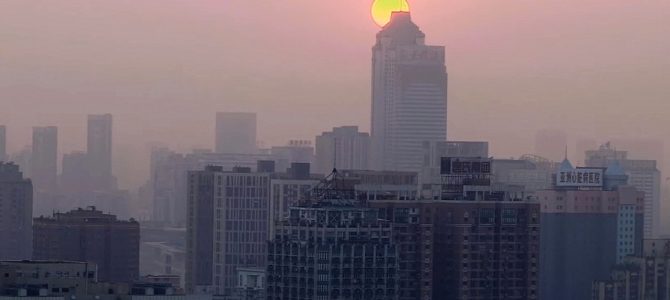
More than a year after the Wuhan coronavirus exploded on to the global scene, an international team of investigators has—finally—gone to China to examine and investigate its causes. But as a new PBS documentary explores, they may not find much during their visit, because China’s Communist government has concealed or destroyed the evidence.
The 90-minute “Frontline” episode, “China’s COVID Secrets,” provides additional details to a story most observers in the Western world have broadly learned since last spring: Chinese stonewalling prevented the world from responding to the coronavirus before it morphed into a global pandemic.
Controversies about use of the term “Wuhan virus” and similar derivatives aside, the film shows where true culpability for the pandemic lies—not with the Chinese people, but with the Communist government. Its inaction cost the lives of thousands of its own citizens, plus a worldwide medical and economic nightmare.
More Damning Details
“Frontline’s” reporting adds new context and information to the general chronology, including leaked documents and an interview with an anonymous worker at Wuhan Central Hospital. The details reinforce the extent of the information that Chinese doctors, and later authorities in the Chinese government, knew during the at least 57 fateful days prior to the Wuhan lockdown:
- Scientists had partial sequences for the virus on Dec. 26, 2019—before China had ever informed other governments and foreign agencies of coronavirus’ existence. Yet the government sat on this partial sequence, and a full sequence completed by four separate labs, until Jan. 11, slowing efforts to test and trace the virus’ spread.
- Even then, the Chinese government wasn’t the first to release the full sequence. A frustrated Australian researcher, working with a virologist based in Shanghai, finally decided to publish it online himself, because he thought it “absolutely ridiculous” that Chinese authorities had forbidden researchers to release this critically important information publicly.
- The Wuhan hospital worker admitted: “Everyone knew it was human-to-human transmission. Even a fool would know.” Yet he said “the hospital told us that we were not allowed to speak to anyone. They wouldn’t even let us wear masks. They said they were afraid of causing panic. I thought the leaders were stupid.”
- In early January, China’s National Health Commission “had sent out secret instructions to laboratories, forbidding them from publishing their results without authorization and requiring them to destroy or hand over their samples”—actions that could make tracking down the outbreak’s original source difficult to impossible.
To be sure, elements of incompetence, or sheer failures of imagination—the medical version of the “fog of war”—also affected China’s response. But when doctors on the ground say “even a fool” knew the virus was spreading among humans, and the government punished doctors like Li Wenliang for trying to prepare and warn their colleagues, the response goes well beyond bureaucratic bungling and into the realm of state-sanctioned malfeasance.
Global Institutions Under Scrutiny
International institutions fare little better than the Chinese government in the documentary. The World Health Organization (WHO), which is supervising the long-delayed investigative trip to China, largely adopted a conciliatory posture towards the Chinese Communist government. In a leaked recording of an internal staff meeting, senior WHO official Mike Ryan offered a prescient warning to his colleagues about their appeasement: “The danger now, despite our good intent, it may be, especially if something happens, there will be a lot of finger-pointing.”
Under international law, China had an obligation to report the existence of a new coronavirus within 24 hours—an obligation it did not meet. Yet one day after Ryan said privately that China’s statements to WHO were “not good enough,” the organization’s representative in China publicly praised the country’s “extremely rapid investigation.”
The WHO representative also claimed that “it appears that the cases have stopped….And we can see that there is no clear evidence of sustained human-to-human transmission”—the exact opposite of the Wuhan hospital worker, who said “even a fool” could have seen the signs.
China’s Government Betrayed Its People
By Jan. 20, when China finally admitted the virus’ human-to-human spread, an estimated 80,000 individuals had become infected. By that point, controlling such a large and widely spread pandemic, with cases seeded throughout China and the world, quickly became an exercise in futility.
As one observer in the “Frontline” documentary noted, other countries bear responsibility for the shortcomings in their pandemic response after Jan. 20, 2020. In the United States, those failures include the botched launch by the Centers for Disease Control and Food and Drug Administration of their coronavirus test, which led to massive yet silent spread of the virus in February and March. But prior to last Jan. 20, responsibility for the pandemic lies solely within the borders of mainland China.
Perhaps the greatest condemnation of the Chinese Communist Party’s behavior comes from Chinese citizens—people like Zhang Hai, who lives in the country’s south. Early last January, he drove his father back to Wuhan, where his father qualified for state-run health care, so he could have an operation following a fall.
In that Wuhan hospital—where doctors wore only “regular masks,” and no other protective equipment, for fear of causing a panic—his father contracted a fatal dose of COVID, leaving Zhang Hai wracked with grief:
It was me personally who brought him to his death. So I feel extremely guilty. At the same time, I’m really angry. Normally, ordinary people believe the government. So when the government says on television that it’s ‘preventable and controllable,’ and when experts say there’s no human-to-human transmission, many ordinary people believe them.
If the Wuhan authorities hadn’t concealed it, my father wouldn’t have left me. Because they covered it up, so many people lost their precious lives.









